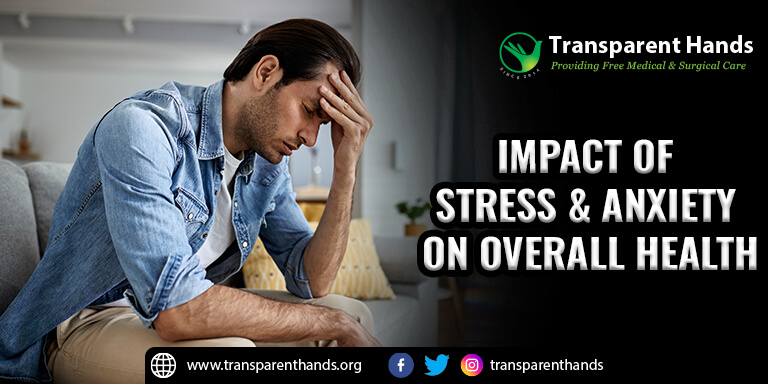Impact of Stress and Anxiety on Overall Health

It is common to feel stressed and anxious in our fast-paced lives and feel the impact of stress and anxiety on our lives. While some stress is normal, persistent or overwhelming stress and anxiety can have a negative impact on our overall health and well-being.
The body’s response to an extra workload that exceeds our ability to cope is stress. Work deadlines, financial difficulties, relationship issues, or major life events are just a few of the many factors that can contribute to it. Anxiety is characterized by a sense of unease, apprehension, or fear about upcoming events or situations. Anxiety disorders are classified into four types: generalized anxiety disorder (GAD), panic disorder, social anxiety disorder, and phobias.
Although stress and anxiety are common occurrences in our lives, their negative effects on our health should not be overlooked. We can effectively manage stress and anxiety by taking preventative measures after understanding their causes and effects.
Impact of Stress and Anxiety on Physical and Mental Health
Disrupted Eating Patterns
Stress and anxiety can cause appetite changes, resulting in either increased or decreased food intake.
Cardiovascular Issues
Chronic anxiety and stress can contribute to high blood pressure, cardiovascular disease, and an increased risk of heart attacks. Stress hormones, such as cortisol, can affect the heart’s rhythm and blood vessels, potentially resulting in cardiovascular disease.
Weakened Immune System
Prolonged stress and anxiety can weaken the immune system, making people more vulnerable to infections and illnesses, as well as slower healing. A fatal impact of anxiety and stress is that the stress hormones can suppress immune function, making the body less capable of fighting pathogens.
Gastrointestinal Problems
Stress and anxiety can cause or aggravate gastrointestinal problems such as stomach ulcers, irritable bowel syndrome, and acid reflux. Stress-induced muscle tension and changes in gut motility can cause digestive discomfort and disruptions.
Sleep Disturbances
Stress and anxiety can disrupt sleep patterns, leading to insomnia or restless sleep. Stress and anxiety can get worse when you do not get enough good sleep, which can start a vicious cycle.
Depression and Mood Disorders
One impact of anxiety and chronic stress is that they can increase the risk of developing depression and other mood disorders.
Cognitive Impairment
Anxiety and stress can impair concentration, memory, and decision-making skills. Chronic stress can cause brain fog, difficulty focusing, and decreased productivity.
Emotional Well-being
Stress and anxiety can cause irritability, restlessness, and a decreased ability to deal with day-to-day challenges. The pleasure you get from things you used to enjoy doing may diminish as well.
Substance Abuse
To cope with anxiety and the impact of stress, some people may turn to unhealthy means, such as alcohol, drugs, or tobacco. Substance abuse can amplify its negative effects on mental health and cause various health problems.
Effect of Anxiety and Stress on Daily Lives
Social Withdrawal
Individuals experiencing chronic stress and anxiety may withdraw from social interactions due to feelings of overwhelm or fear. This withdrawal can further contribute to feelings of loneliness and isolation.
Impact on Relationships
The impact of stress and anxiety can strain relationships due to increased irritability, communication difficulties, and decreased emotional engagement. Intimate relationships, friendships, and professional connections may suffer as a result.
Work Undertaking
Chronic stress and anxiety can impair work performance, leading to decreased productivity, difficulty meeting deadlines, and increased absenteeism. The cognitive and emotional impact of stress and anxiety can hinder focus and concentration in the workplace.
Managing Stress and Anxiety in Daily Life
Prioritize Sleep
The first step to managing stress and anxiety is to follow a consistent sleep schedule and create a relaxing bedtime routine. It is also important to avoid using any electronic devices before bed to create a calm sleeping environment.
Engage in Regular Exercise
Engage in physical activities that you enjoy, such as walking, yoga, or dancing. Exercise produces endorphins, which reduce stress hormones and improve mood. Deep breathing exercises, meditation, and progressive muscle relaxation can all aid in the relaxation of the mind and body. Consider incorporating mindfulness practices into your daily routine to help you relax and reduce stress.
Balanced Diet
It is advisable to consume a well-balanced diet rich in Vitamin C, Vitamin D, fruits, vegetables, whole grains, and lean proteins to manage the impact of anxiety and stress. Avoid excessive caffeine, sugar, and processed foods, which can contribute to mood swings and energy crashes.
Limit Substance Use
Alcohol, tobacco, and recreational drugs should be limited or avoided because they can exacerbate stress and anxiety symptoms. These substances may provide temporary relief, but they can aggravate underlying problems.
Hydration
Drink plenty of water throughout the day to keep yourself from getting dehydrated. Dehydration has been linked to mood and physical changes.
Time Management
To avoid being overloaded, prioritize tasks and establish realistic goals. To accomplish more and feel less pressured, break down big tasks into smaller, more manageable chunks. Set firm limits on your time spent at work, in relationships, and in your social life. Master the art of politely declining requests and making time for rest and relaxation.
Social Support
Discuss your feelings and experiences with reliable friends, family members, or support groups. Stress and anxiety can be reduced by sharing concerns and seeking empathy.
Professional Help
Seek advice from mental health professionals such as therapists or counselors. They can offer valuable insights, coping strategies, and support that is tailored to your specific requirements.
Conclusion
Managing stress and anxiety in everyday life is critical for overall well-being. Individuals can significantly reduce the impact of stress and anxiety on their lives by prioritizing self-care practices, adopting healthy lifestyle habits, utilizing effective stress management techniques, and seeking support when needed.










Leave Your Comments